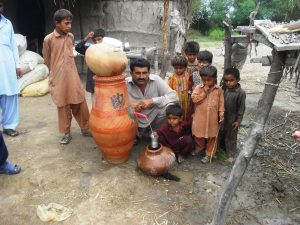AHD Sustainable Activities Focusing on El Nino/Climate Change for Rural Women.
Dangerous health issues caused by traditional stoves
Most countries assign women to the role of cooks, and depending on the needs of the regional cuisine, they may spend nearly three to seven hours a day in front of the stove. The World Health Organization (WHO) reports that women account for 59% of all deaths caused by indoor air pollution. Little children who spend a lot of time near their mother run a serious danger of inhaling smoke from cooking fires when they are still developing. The use of open-fire traditional stoves has negative effects on livelihood and the environment, in addition to the health burden.
AHD has introduced the innovative idea of replacing the traditional stove with the Fuel-Efficient Cooking Stove (FECS).
FES is another one of AHD’s sustainable programs. The stove is designed to use less fuel compared to traditional stoves, which can help reduce deforestation and improve air quality by reducing smoke and greenhouse gas emissions. This also reduces the need for households to collect and purchase fuel, saving them time and money. The FES stove is made of durable materials, such as clay, which are locally sourced and long-lasting. The stoves are designed to be repaired and maintained easily, reducing the need for replacement and waste. The stove is designed to be culturally appropriate and user-friendly, which increases the likelihood of adoption and sustained use. By involving the community in the design and implementation of the stoves, the project aims to ensure that the stoves meet their needs and preferences. Overall, the FES cooking stove is a sustainable product that can have positive impacts on the environment, health, and livelihoods of communities while being durable and culturally appropriate for sustained use.
AHD constructed a model cooking stove that is efficient in cooking as well as reducing the consumption of wood, and dual stoves operate at the same time. It consumes 50% less wood. One cooking stove saves 5 kg of wood per day. More than 65,000 cooking stoves have been installed by the AHD team. It prevents the burning of 325,000 kg of wood per day. In 12 months, 118,625,000 kg and 2,965,625 mounds of wood were saved through fuel-efficient stoves. It’s a big contribution by AHD to save lives from the harmful effects of El Nino and climate change. After the implementation of the FECS model in the communities, AHD took their feedback, which is shown in the following video below:




